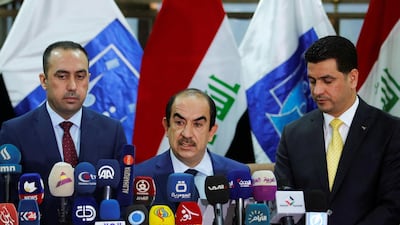Iraq's election authority has decided to cancel the results from more than 1,000 polling stations in the May 12 general election following allegations of fraud.
The Independent High Electoral Commission (IHEC) said the polling stations were in 10 of Iraq's 19 provinces and in six countries where voting was held for Iraqi expatriates.
"The commission has opened an investigation into 2,000 polling stations and cancelled the votes of 1,021 stations across and outside of Iraq late on Wednesday," IHEC member Saeed Al Kaki told The National.
There have been widespread allegations of irregularities in the election, in which a coalition led by nationalist Shiite cleric Moqtada Al Sadr was the biggest winner with 54 of the 329 seats in parliament. However, the election result has yet to be ratified by the federal supreme court.
The commission on Thursday said it would present the findings of its investigation to the court, which will decide whether to uphold the cancellation of votes, order a recount, or to call for fresh elections.
In an effort to combat fraud, the May 12 election saw the introduction of electronic voting for the first time in some areas, yet a number of politicians and monitoring groups have said the voting machines were hacked.
"Cancelling a big number of the polling stations does not remove any doubts [over election results], on the contrary, now voters are convinced that electoral fraud took place and votes were rigged," said Kamal Chomani, a non-resident fellow at the Washington-based Tahrir Institute for Middle East Policy.
On Tuesday, the outgoing parliament passed a resolution demanding an investigation by the government into alleged electoral fraud, and a partial recount of 10 per cent of the total votes cast. If the result differs by more than 25 per cent from that announced by IHEC, then a manual recount must be held of all the nearly 11 million ballots cast.
The resolution also sought the annulment of votes cast overseas and in camps for displaced Iraqis in Anbar, Salahuddin and Diyala provinces because of alleged voter manipulation.
_______________
Read more:
Iraqi supreme court rejects appeal to cancel election results
Could Ali Allawi be Iraq's next prime minister?
_______________
"Unfortunately, the election commission this time around was weak which allowed many issues and problems to occur," Jaber Al Jaberi, an MP representing Anbar province, told The National.
Mr Al Jaberi said the number of votes cast in displacement camps in Anbar exceeded the number of voters registered with the ministry of immigration, which added pressure on the commission to cancel the votes.
"This is why the parliament voted to cancel votes from overseas and within displacement camps - because they found fraud within the systems," he said.
Parliament does not have authority to issue orders to IHEC, but “if the commission found that over a thousand polling stations have had irregularities then it must accept the parliament’s request to cancel some of the partial results”, Mr Al Kaki said.
Prime Minister Haider Al Abadi last week ordered the creation of a high-powered commission comprising financial, intelligence and security experts to look into alleged election irregularities.
Meanwhile, the UN envoy for Iraq has urged political leaders to swiftly form an inclusive government that will bridge sectarian and ethnic divides.
Jan Kubis told the Security Council on Wednesday that Iraq’s new government would need to “work as one to pursue much needed political and economic and social reforms".
The US Ambassador to the UN Nikki Haley also called the post-election period "a key moment in Iraqi history", saying the next government would have to make decisions "that will set Iraq's course for decades to come".
The new government will decide "whether to truly value diversity and create opportunities for all of Iraq's people" and "whether Iraq is serious about elevating female leaders", she said.
"And it will be responsible for governing inclusively," Mrs Haley said. "That means setting policies that allow Iraq to close the door on the extremism and the sectarian politics that have caused so much suffering before.


